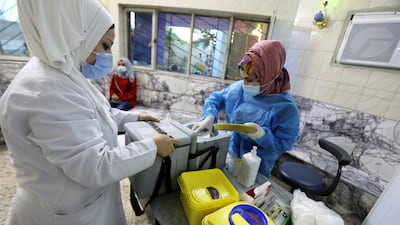Large numbers of healthcare workers in the Middle East and North Africa remain unvaccinated against Covid-19, the World Health Organisation has warned.
Of the 12 countries that shared vaccination data, only four — Pakistan, Jordan, Iran and Saudi Arabia — reported that close to 100 per cent of healthcare workers had been vaccinated.
Some nations have struggled to deliver doses, with Afghanistan, Syria, Sudan, Somalia, Libya, Yemen and Djibouti all administering significantly fewer doses than had been received, mainly due to storage or supply chain issues.
In Iraq, while more than 60 per cent of healthcare workers have been partially vaccinated, less than 40 per cent are fully vaccinated. The WHO said that only 19 per cent of the population has been fully vaccinated.
Covid-19 vaccination regional co-ordinator
And in Yemen, less than 70 per cent of healthcare workers have been partially vaccinated, while a little more than 20 per cent are fully vaccinated. Meanwhile, only 2 per cent of the general population has been fully vaccinated.
Health experts said Covid vaccines should be incorporated into national vaccination programmes on a regular basis to ensure widespread coverage, similar to annual flu vaccines.
Dr Mohammed Osama Mere, the WHO's Covid-19 vaccination regional co-ordinator, said reduced risk perception is likely to make delivering vaccines harder in the years ahead.
“Unfortunately, in a few countries, we saw that health workers were resisting the Covid vaccines,” he said at a briefing in Cairo on Monday.
“The WHO issued guidelines and at regional levels developed baseline plans to help countries increase coverage among healthcare workers.”
Doctors, NGOS and community leaders can influence the decision to take a vaccine, he added.

“We would like to see a list of health workers who are vaccinated or not and to make a reward like a certificate [or incentive] for those who are vaccinated,” he continued.
“The most important thing is to monitor this and it needs a focus on the local context in each country.
“We need to continue with the vaccination as we do not know how this Covid virus will behave in the future.”
In a targeted campaign to boost vaccination rates, the WHO will launch a three-month strategy aimed at 21.7 million people in Sudan, Somalia and Yemen.
Many international experts have only recommended boosters for vulnerable groups, social workers and health workers.
After the second dose four to six months after the first, there is no recommendation from the WHO for further vaccines, Dr Mere said.
“The pandemic is not over, even though cases are much less — thousands are still dying each day,” he said.
“People must know about the disease and its impact.
“When people see the effects of Covid, it makes them want to take a vaccine.”


